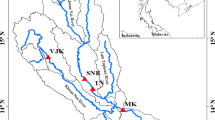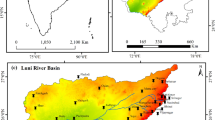Abstract
Climate change is adversely affecting the development, management, and planning of surface and groundwater resources. The meteorological drought becomes a severe natural problem, and it can occur in any climatic region of the world. Thus, monitoring and minimizing drought is crucial for analyzing and predicting drought impacts. The meteorological drought is considered basin or region-specific since atmospheric conditions are highly variable from region to region. However, agricultural drought links the various characteristics of hydrological or meteorological drought to agricultural impacts focusing on groundwater deficit, soil moisture deficit, etc. A single drought index cannot assess each aspect of the meteorological drought. In this study, we considered seven drought indices such as the Standardized Precipitation Index (SPI), China Z Index (CZI), Modified China Z Index (MCZI), Percent Normal Drought Index (PNI), Deciles Index (DI), Rainfall Anomaly Index (RAI), and Z-score Index (ZSI). The drought was analyzed for 3, 6, 9, and 12 months’ time step, and drought classification and threshold values were estimated. SPI showed maximum correlation values (0.389, 0.412, 0.560, and 0.996) for 3, 6, 9, and 12 month time steps compared to the other drought indices. The value of correlation is increased with the increase in time step for all drought indices; therefore, the accuracy of drought assessment also increases with an increase in time step. The Mann–Kendall’s trend test was analyzed at a 5% significance level for drought assessments. The drought magnitude and the severity of the Betwa River basin were estimated based on the meteorological data (Rainfall) from 1970 to 2014.






Similar content being viewed by others
Data availability
All data used in the study are freely available on http://www.mpwrd.gov.in/betwa-basin website.
Code availability
No code was developed in the current study.
References
Abbasian MS, Najafi MR, Abrishamchi A (2021) Increasing risk of meteorological drought in the Lake Urmia basin under climate change: introducing the precipitation–temperature deciles index. J Hydrol 592:125586. https://doi.org/10.1016/j.jhydrol.2020.125586
Alsubih M, Mallick J, Talukdar S, Salam R, AlQadhi S, Fattah M, Thanh NV (2021) An investigation of the short-term meteorological drought variability over Asir Region of Saudi Arabia. Theoret Appl Climatol 145(1):597–617. https://doi.org/10.1007/s00704-021-03647-4
Belayneh A, Adamowski J, Khalil B, Ozga-Zielinski B (2014) Long-term SPI drought forecasting in the Awash River Basin in Ethiopia using wavelet neural network and wavelet support vector regression models. J Hydrol 508:418–429. https://doi.org/10.1016/j.jhydrol.2013.10.052
Bhunia P, Das P, Maiti R (2020) Meteorological drought study through SPI in three drought prone districts of West Bengal India. Earth Syst Environ 4(1):43–55. https://doi.org/10.1007/s41748-019-00137-6
Blain GC (2011) Standardized precipitation index based on Pearson type III distribution. Revista Brasileira De Meteorologia 26(2):167–180. https://doi.org/10.1590/S0102-77862011000200001
Dai A, Trenberth KE, Qian T (2004) A global dataset of Palmer Drought Severity Index for 1870–2002: relationship with soil moisture and effects of surface warming. J Hydrometeorol 5(6):1117–1130. https://doi.org/10.1175/JHM-386.1
Daneshmand H, Mahmoudi P (2017) Estimation and assessment of temporal stability of periodicities of droughts in Iran. Water Resour Manage 31(11):3413–3426. https://doi.org/10.1007/s11269-017-1676-8
Desai S, Singh DK, Islam A, Sarangi A, Khanna M (2019) Trend analysis of climatic variables in Betwa River basin. Indian J Agric Sci 89(6):1033–1038
Dogan S, Berktay A, Singh VP (2012) Comparison of multi-monthly rainfall-based drought severity indices, with application to semi-arid Konya closed basin, Turkey. J Hydrol 470:255–268. https://doi.org/10.1016/j.jhydrol.2012.09.003
Edossa DC, Babel MS, Gupta AD (2010) Drought analysis in the Awash River basin. Ethiopia Water Resources Management 24(7):1441–1460. https://doi.org/10.1007/s11269-009-9508-0
Gibbs WJ, Maher JV (1967) Rainfall deciles as drought indicators, bureau of meteorology bulletin no. 48. Commonwealth of Australia, Melbourne, p 29
Ghulam A, Qin Q, Kusky T, Li ZL (2008) A re-examination of perpendicular drought indices. Int J Remote Sens 29(20):6037–6044. https://doi.org/10.1080/01431160802235811
GOI (2016) Manual for drought management. Department of Agriculture, Cooperation & Farmers Welfare Ministry of Agriculture & Farmers Welfare, Government of India, New Delhi. https://agricoop.nic.in/sites/default/files/DroughtManual.pdf
Guttman NB (1999) Accepting the standardized precipitation index: a calculation algorithm 1. JAWRA J Am Water Resour Assoc 35(2):311–322. https://doi.org/10.1111/j.1752-1688.1999.tb03592.x
Haied N, Foufou A, Chaab S, Azlaoui M, Khadri S, Benzahia K, Benzahia I (2017) Drought assessment and monitoring using meteorological indices in a semi-arid region. Energy Procedia 119:518–529. https://doi.org/10.1016/j.egypro.2017.07.064
Hangshing L, Dabral PP (2018) Multivariate frequency analysis of meteorological drought using Copula. Water Resour Manage 32(5):1741–1758. https://doi.org/10.1007/s11269-018-1901-0
Jain VK, Pandey RP, Jain MK, Byun HR (2015) Comparison of drought indices for appraisal of drought characteristics in the Ken River Basin. Weather and Climate Extremes 8:1–11. https://doi.org/10.1016/j.wace.2015.05.002
Jang D (2018) Assessment of meteorological drought indices in Korea using RCP 85 scenario. Water 10(3):283. https://doi.org/10.3390/w10030283
Jeet P, Singh DK, Sarangi A (2019) Groundwater potential in a drought prone Betwa River basin Bundelkhand. Indian J Agric Sci 89(10):1623–1627
Ji L, Peters AJ (2003) Assessing vegetation response to drought in the northern Great Plains using vegetation and drought indices. Remote Sens Environ 87(1):85–98. https://doi.org/10.1016/S0034-4257(03)00174-3
Ju XS, Yang XW, Chen LJ, Wang YM (1997) Research on determination of indices and division of regional flood/drought grades in China (in Chinese). Q J Appl Meteorol 8(1):26–33
Kao SC, Govindaraju RS (2008) Trivariate statistical analysis of extreme rainfall events via the Plackett family of copulas. Water Resour Res 44(2). https://doi.org/10.1029/2007WR006261
Kendall MG (1975) Rank correlation methods, 4th edn. Charles Griffin, London
Khan MI, Liu D, Fu Q, Faiz MA (2018) Detecting the persistence of drying trends under changing climate conditions using four meteorological drought indices. Meteorol Appl 25(2):184–194. https://doi.org/10.1002/met.1680
Khan MMH, Muhammad NS, El-Shafie A (2020) Wavelet based hybrid ANN-ARIMA models for meteorological drought forecasting. J Hydrol 590:125380. https://doi.org/10.1016/j.jhydrol.2020.125380
Knutson C, Hayes M, Phillips T (1998) How to reduce drought risk. https://digitalcommons.unl.edu/droughtfacpub/168/
Lee Rodgers J, Nicewander WA (1988) Thirteen ways to look at the correlation coefficient. Am Stat 42(1):59–66. https://doi.org/10.2307/2685263
Li Y, Yao N, Sahin S, Appels WM (2017) Spatiotemporal variability of four precipitation-based drought indices in **njiang. China Theor Appl Climatol 129(3):1017–1034. https://doi.org/10.1007/s00704-016-1827-5
Mahmoudi P, Rigi A, Kamak MM (2019) Evaluating the sensitivity of precipitation-based drought indices to different lengths of record. J Hydrol 579:124181. https://doi.org/10.1016/j.jhydrol.2019.124181
Mann HB (1945) Nonparametric tests against trend. Econometrica:245–259. https://www.jstor.org/stable/1907187
McKee TB, Doesken NJ, Kleist J (1993) The relationship of drought frequency and duration to time scales. In: Proceedings of the 8th Conference on Applied Climatology, vol. 17, no. 22, pp. 179–183. https://climate.colostate.edu/pdfs/relationshipofdroughtfrequency.pdf
Mishra AK, Desai VR (2006) Drought forecasting using feed-forward recursive neural network. Ecol Model 198(1–2):127–138. https://doi.org/10.1016/j.ecolmodel.2006.04.017
Morid S, Smakhtin V, Moghaddasi M (2006) Comparison of seven meteorological indices for drought monitoring in Iran. Int J Climatol A J Royal Meteorol Soc 26(7):971–985. https://doi.org/10.1002/joc.1264
Najafi MR, Zwiers FW, Gillett NP (2017) Attribution of observed streamflow changes in key British Columbia drainage basins. Geophys Res Lett 44(21):11–012. https://doi.org/10.1002/2017GL075016
Obasi GOP (1994) WMO’s role in the international decade for natural disaster reduction. Bulletin of the American Meteorological Society 75(9):1655–1661 https://www.jstor.org/stable/26231968
Pandey RP, Dash BB, Mishra SK, Singh R (2008) Study of indices for drought characterization in KBK districts in Orissa (India). Hydrol Proc Int J 22(12):1895–1907. https://doi.org/10.1002/hyp.6774
Patel NR, Chopra P, Dadhwal VK (2007) Analyzing spatial patterns of meteorological drought using standardized precipitation index Meteorological Applications. J Forecast Pract Appl Train Tech Model 14(4):329–336. https://doi.org/10.1002/met.33
Roy AK, Hirway I (2007) Multiple impacts of droughts and assessment of drought policy in major drought prone states in India. Centre for Development Alternatives, Gujarat. https://www.researchgate.net/profile/Anil-Roy-8/publication/310774764_Multiple_Impacts_of_Droughts_and_Assessment_of_Drought_Policy_in_Major_Drought_Prone_States_in_India/links/5836d5f708aed45931c80637/Multiple-Impacts-of-Droughts-and-Assessment-of-Drought-Policy-in-Major-Drought-Prone-States-in-India.pdf
Salehnia N, Alizadeh A, Sanaeinejad H, Bannayan M, Zarrin A, Hoogenboom G (2017) Estimation of meteorological drought indices based on AgMERRA precipitation data and station-observed precipitation data. J Arid Land 9(6):797–809. https://doi.org/10.1007/s40333-017-0070-y
Sen PK (1968) Estimates of the regression coefficient based on Kendall’s tau. J Am Stat Assoc 63(324):1379–1389. https://doi.org/10.2307/2285891
Shaban A (2009) Indicators and aspects of hydrological drought in Lebanon. Water Resour Manage 23(10):1875–1891. https://doi.org/10.1007/s11269-008-9358-1
Shahabfar A, Eitzinger J (2009) An evaluation of drought indices in different climatic regions. In: EGU General Assembly Conference Abstracts, p 456. https://ui.adsabs.harvard.edu/abs/2009EGUGA..11..456S/abstract
Sheffield J, Wood EF (2008) Projected changes in drought occurrence under future global warming from multi-model, multi-scenario, IPCC AR4 simulations. Clim Dyn 31(1):79–105. https://doi.org/10.1007/s00382-007-0340-z
Singh U, Sharma PK (2021) Drought forecasting using the stochastic model in the Betwa River basin, India. Model Earth Syst Environ1–16. https://doi.org/10.1007/s40808-021-01187-4
Smakhtin VU, Hughes DA (2007) Automated estimation and analyses of meteorological drought characteristics from monthly rainfall data. Environ Model Softw 22(6):880–890. https://doi.org/10.1016/j.envsoft.2006.05.013
Surendran U, Anagha B, Raja P, Kumar V, Rajan K, Jayakumar M (2019) Analysis of drought from humid, semi-arid and arid regions of India using DrinC model with different drought indices. Water Resour Manage 33(4):1521–1540. https://doi.org/10.1007/s11269-019-2188-5
Suryavanshi S, Pandey A, Chaube UC, Joshi N (2014) Long-term historic changes in climatic variables of Betwa Basin India. Theor Appl Climatol 117(3):403–418. https://doi.org/10.1007/s00704-013-1013-y
Tencer B, Weaver A, Zwiers F (2014) Joint occurrence of daily temperature and precipitation extreme events over Canada. J Appl Meteorol Climatol 53(9):2148–2162. https://doi.org/10.1175/JAMC-D-13-0361.1
Tsakiris G, Nalbantis I, Vangelis H, Verbeiren B, Huysmans M, Tychon B, Batelaan O (2013) A system-based paradigm of drought analysis for operational management. Water Resour Manage 27(15):5281–5297. https://doi.org/10.1007/s11269-013-0471-4
Van Rooy MP (1965) A rainfall anomally index independent of time and space. NOTOS
Vicente-Serrano SM, González-Hidalgo JC, de Luis M, Raventós J (2004) Drought patterns in the Mediterranean area: the Valencia region (eastern Spain). Climate Res 26(1):5–15. https://doi.org/10.3354/cr026005
Wilhite DA (2000) Drought as a natural hazard: concepts and definitions. https://digitalcommons.unl.edu/droughtfacpub/69/
Willeke G, Hosking JRM, Wallis JR, Guttman NB (1994) The national drought atlas. Institute for water resources report, 94
Wilson EB, Hilferty MM (1931) The distribution of chi-square. Proc Natl Acad Sci USA 17(12):684. https://www.ncbi.nlm.nih.gov/pmc/articles/PMC1076144/
Wu J, Chen X, Yao H, Zhang D (2021) Multi-timescale assessment of propagation thresholds from meteorological to hydrological drought. Sci Total Environ 765:144232. https://doi.org/10.1016/j.scitotenv.2020.144232
Wu H, Hayes MJ, Weiss A, Hu Q (2001) An evaluation of the Standardized Precipitation Index, the China-Z Index and the statistical Z-Score. Int J Climatol J the Royal Meteorol Soc 21(6):745–758. https://doi.org/10.1002/joc.658
**aosheng J, **anwei Y, Lijuan C, Youmin W (1997) Research on determination of station indexes and division of regional flood/drought grades in China. J Appl Meteor Sci 8(1):26–33. http://qikan.camscma.cn/jamsweb/en/article/id/19970104
Xu D, Zhang Q, Ding Y, Huang H (2020) Application of a hybrid ARIMA–SVR model based on the SPI for the forecast of drought—a case study in Henan Province, China. J Appl Meteorol Climatol 59(7):1239–1259. https://doi.org/10.1175/JAMC-D-19-0270.1
Zhai J, Su B, Krysanova V, Vetter T, Gao C, Jiang T (2010) Spatial variation and trends in PDSI and SPI indices and their relation to streamflow in 10 large regions of China. J Clim 23(3):649–663. https://doi.org/10.1175/2009JCLI2968.1
Acknowledgements
The authors would like to thank anonymous reviewers for giving valuable suggestions to improve the quality of the paper.
Author information
Authors and Affiliations
Contributions
Uttam Singh contributed in conceptualization, methodology, resources, writing (original draft), and analysis. Pooja Agrawal contributed in data curation and formal analysis. Pramod Kumar Sharma contributed in writing (review and editing).
Corresponding author
Ethics declarations
Ethics approval
The authors paid attention to the ethical rules in the study. There is no violation of ethics.
Consent to participate
The data of this research were not prepared through a questionnaire.
Consent for publication
If this manuscript is accepted, it can be published in the Theoretical and Applied Climatology journal.
Conflict of interest
The authors declare no competing interests.
Additional information
Publisher’s note
Springer Nature remains neutral with regard to jurisdictional claims in published maps and institutional affiliations.
Rights and permissions
About this article
Cite this article
Singh, U., Agarwal, P. & Sharma, P.K. Meteorological drought analysis with different indices for the Betwa River basin, India. Theor Appl Climatol 148, 1741–1754 (2022). https://doi.org/10.1007/s00704-022-04027-2
Received:
Accepted:
Published:
Issue Date:
DOI: https://doi.org/10.1007/s00704-022-04027-2




